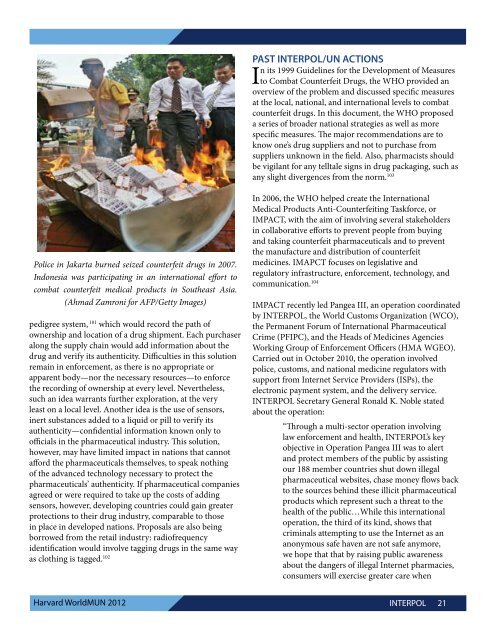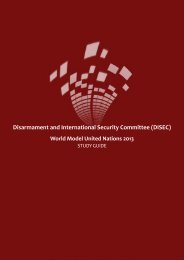INTERPOL - World Model United Nations
INTERPOL - World Model United Nations
INTERPOL - World Model United Nations
You also want an ePaper? Increase the reach of your titles
YUMPU automatically turns print PDFs into web optimized ePapers that Google loves.
Police in Jakarta burned seized counterfeit drugs in 2007.<br />
Indonesia was participating in an international eort to<br />
combat counterfeit medical products in Southeast Asia.<br />
(Ahmad Zamroni for AFP/Getty Images)<br />
pedigree system, 101 which would record the path of<br />
ownership and location of a drug shipment. Each purchaser<br />
along the supply chain would add information about the<br />
drug and verify its authenticity. Diculties in this solution<br />
remain in enforcement, as there is no appropriate or<br />
apparent body—nor the necessary resources—to enforce<br />
the recording of ownership at every level. Nevertheless,<br />
such an idea warrants further exploration, at the very<br />
least on a local level. Another idea is the use of sensors,<br />
inert substances added to a liquid or pill to verify its<br />
authenticity—condential information known only to<br />
ocials in the pharmaceutical industry. is solution,<br />
however, may have limited impact in nations that cannot<br />
aord the pharmaceuticals themselves, to speak nothing<br />
of the advanced technology necessary to protect the<br />
pharmaceuticals’ authenticity. If pharmaceutical companies<br />
agreed or were required to take up the costs of adding<br />
sensors, however, developing countries could gain greater<br />
protections to their drug industry, comparable to those<br />
in place in developed nations. Proposals are also being<br />
borrowed from the retail industry: radiofrequency<br />
identication would involve tagging drugs in the same way<br />
as clothing is tagged. 102<br />
PAST <strong>INTERPOL</strong>/UN ACTIONS<br />
In its 1999 Guidelines for the Development of Measures<br />
to Combat Counterfeit Drugs, the WHO provided an<br />
overview of the problem and discussed specic measures<br />
at the local, national, and international levels to combat<br />
counterfeit drugs. In this document, the WHO proposed<br />
a series of broader national strategies as well as more<br />
specic measures. e major recommendations are to<br />
know one’s drug suppliers and not to purchase from<br />
suppliers unknown in the eld. Also, pharmacists should<br />
be vigilant for any telltale signs in drug packaging, such as<br />
any slight divergences from the norm. 103<br />
In 2006, the WHO helped create the International<br />
Medical Products Anti-Counterfeiting Taskforce, or<br />
IMPACT, with the aim of involving several stakeholders<br />
in collaborative eorts to prevent people from buying<br />
and taking counterfeit pharmaceuticals and to prevent<br />
the manufacture and distribution of counterfeit<br />
medicines. IMAPCT focuses on legislative and<br />
regulatory infrastructure, enforcement, technology, and<br />
communication. 104<br />
IMPACT recently led Pangea III, an operation coordinated<br />
by <strong>INTERPOL</strong>, the <strong>World</strong> Customs Organization (WCO),<br />
the Permanent Forum of International Pharmaceutical<br />
Crime (PFIPC), and the Heads of Medicines Agencies<br />
Working Group of Enforcement Ocers (HMA WGEO).<br />
Carried out in October 2010, the operation involved<br />
police, customs, and national medicine regulators with<br />
support from Internet Service Providers (ISPs), the<br />
electronic payment system, and the delivery service.<br />
<strong>INTERPOL</strong> Secretary General Ronald K. Noble stated<br />
about the operation:<br />
“rough a multi-sector operation involving<br />
law enforcement and health, <strong>INTERPOL</strong>’s key<br />
objective in Operation Pangea III was to alert<br />
and protect members of the public by assisting<br />
our 188 member countries shut down illegal<br />
pharmaceutical websites, chase money ows back<br />
to the sources behind these illicit pharmaceutical<br />
products which represent such a threat to the<br />
health of the public…While this international<br />
operation, the third of its kind, shows that<br />
criminals attempting to use the Internet as an<br />
anonymous safe haven are not safe anymore,<br />
we hope that that by raising public awareness<br />
about the dangers of illegal Internet pharmacies,<br />
consumers will exercise greater care when<br />
Harvard <strong>World</strong>MUN 2012 <strong>INTERPOL</strong> 21

















